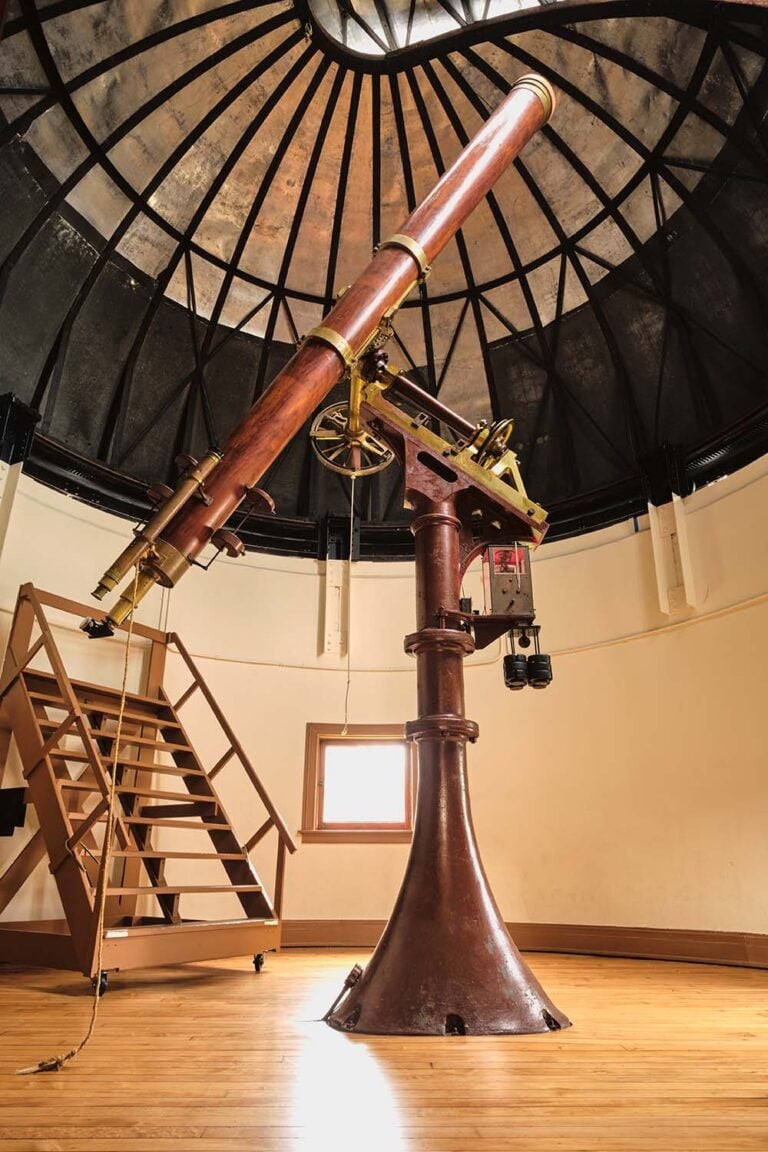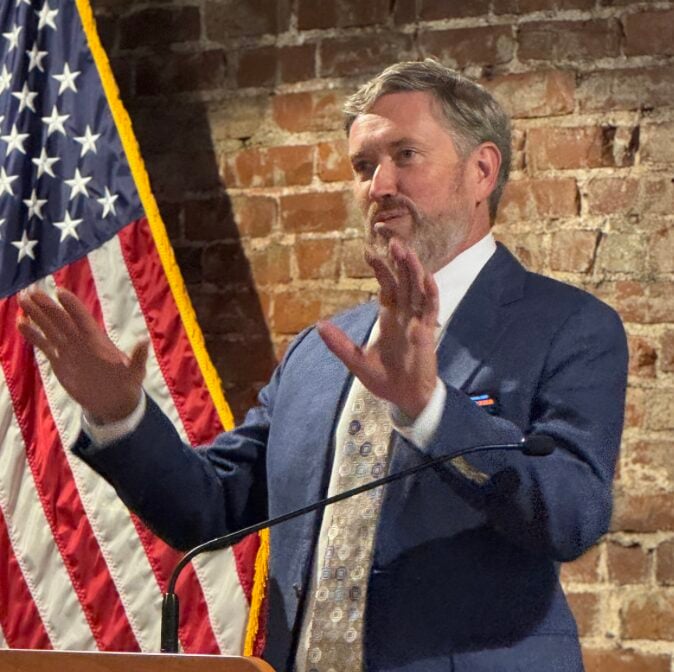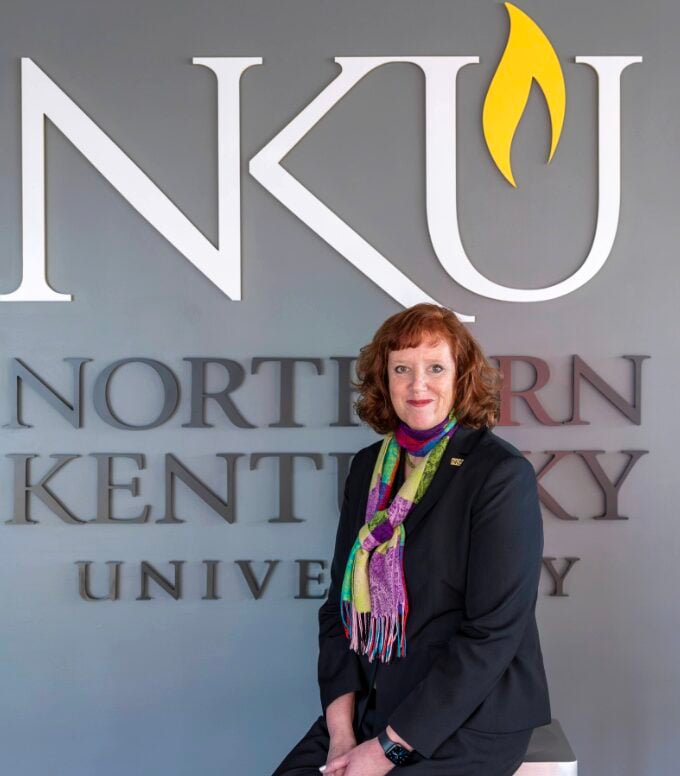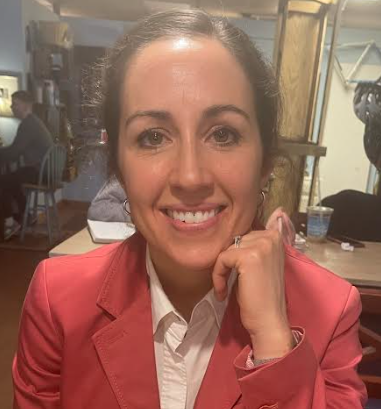Returning to Scripps Howard Foundation’s national journalism awards as a guest was a real treat in more ways than one.
For me, it was a reunion with my roots. Being a guest at the awards and not having the responsibility for them was one plus. Seeing a lot of old friends and colleagues was another, particularly Scripps family friends — Maggie Scripps Klenzing, Becky Scripps Brickner, Julie Scripps Heidt, Paul Scripps to name a few — as well as colleagues from the Foundation and Company with whom I had worked so long.
And to hear Scripps CEO Rich Boehne speak eloquently to the “noble calling” and the mission reflected in the company’s motto, “Give Light and the People Will Find Their Own Way,” was both a reminder and a reassurance.
This work really matters.
The awards presentation was held in Cincinnati, headquarters of the E.W. Scripps Company, in the Aronoff Theater.
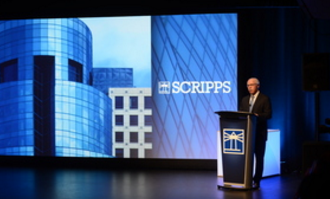
In their 64th year, the Scripps Howard Awards are among the most prestigious in journalism. I can attest that they are honest and true, with winners chosen in the most transparent process possible. They are open to all, and not just to Scripps entities. They celebrate excellence in 17 categories, with prize money totaling $180,000.
And again this year, the winning journalists and news outlets demonstrated courage, resourcefulness and ingenuity — and told stories with lasting impact. The award winners, honored by a classy, well scripted program as well as money and a custom award were:
Investigative Reporting, Ursula and Gilbert Farfel Prize — $20,000
“Doctors & Sex Abuse” — Atlanta Journal-Constitution
In two-thirds of sexual abuse cases, Georgia doctors were allowed to keep their medical licenses, so the Atlanta Journal-Constitution set forth on an investigation into tolerance of sexual abuse by physicians nationwide. Stories of abuse had remained untold in part because the nation’s 64 state medical boards do not keep databases of disciplined doctors. The only national accounting of physician discipline is, by law, anonymous to the public.
Determined to find a way around the barriers of controlled medical board documents, the newspaper wrote computer programs to collect 100,000 disciplinary documents representing every state. The series is sparking changes at state medical boards and in state legislatures.
Topic of the Year — $10,000 — the 2016 Presidential Election
Alec MacGillis — “The Breakdown,” ProPublica
Alec MacGillis spent 2016 visiting the heartland, measuring the mounting wave of discontent, frustration and anger. With this background on the sentiment toward Donald Trump, it took just hours for MacGillis to pound out a post-election piece of deeply reported analysis – “Revenge of the Forgotten Class.”
The story capped a year of reporting on the changes underlying the political season.
Public Service Reporting, Roy W. Howard Award — $10,000
“Special Education Denied” — Houston Chronicle
To offset its financial deficit, the Texas Education Agency set an unprecedented – and secretive – benchmark that its school districts should have no more than 8.5 percent of students in special education. Until the Houston Chronicle launched “Special Education Denied,” no one outside a tight circle of state officials and school administrators even knew the decree existed. The paper assembled and analyzed millions of lines of data that showed Texas’ special education enrollments were the lowest in America by far and interviewed more than 800 people about their experiences. The series sparked action by the U.S. Department of Education to order the state to eliminate the benchmark and provide the proper education.
Photojournalism — $10,000
Daniel Berehulak — The New York Times

Over 35 days, Daniel Berehulak documented 41 crime scenes with 57 fatalities in the Philippines – evidence of the president’s promise to rid the country of drug addicts and dealers. Berehulak unearthed back stories, contradicted police accounts, cataloged crowded jails and witnessed wrenching funeral scenes. His photos and reports were viewed nearly 3 million times in multiple languages and is credited as a factor in the United States’ decision to defer financial aid to the Philippines.
Opinion, Walker Stone Award — $10,000
Stephen Henderson — Detroit Free Press
Stephen Henderson brought weighty perspective to 2016’s major issues through the lens of historical narratives – American, racial, literary and his own. He fashioned powerful arguments about issues that ranged from the presidential election to police shootings of black citizens to the water crisis in Flint, Michigan. He excavated connections between personal and public histories as he began work to revitalize the Detroit neighborhood where he was born and raised.
Environmental Reporting, Edward J. Meeman Award — $10,000
Rob Davis — “Toxic Armories” The Oregonian/OregonLive
Although a military audit 20 years ago warned that indoor firing ranges exposed soldiers and the public to lead dust, it was not until Rob Davis raised questions about lead levels in National Guard armories that the military took action. Davis devoted 18 months to investigating the dangers of unsafe lead levels inside National Guard armories still in use by the military and the public. He filed 100 public record requests and obtained 23,000 pages of inspection reports. He discovered the military had failed to properly ventilate and clean indoor gun ranges at the armories. After the publication, the Guard closed every one of its toxic U.S. armories to the public.
Business/Economics Reporting, William Brewster Styles Award — $10,000
“The Panama Papers” — The International Consortium of Investigative Journalists, McClatchy and the Miami Herald
Journalists from nearly 80 countries speaking dozens of languages joined forces to delve into 11.5 million files, 214,000 offshore entities and almost 40 years of records, collectively known as “The Panama Papers.” The trove of leaked documents came from a Panama-headquartered law firm that establishes offshore accounts for its clients. It exposed offshore hideaways tied to mega-banks, corporate bribery scandals, drug kingpins, arms traffickers and a network of people close to Russian President Vladimir Putin that shuffled as much as $2 billion around the world. Since the investigation, governments and corporations in 79 countries have opened at least 150 inquiries, audits or investigations.
Breaking News — $10,000
East Bay Times “Oakland’s Ghost Ship Fire”
Less than four hours after inquiring into a warehouse fire, the East Bay Times began piecing together the causes behind what would become the deadliest fire in Oakland’s history. The newspaper uncovered fire code violations, no permit for residency in the structure and problems that impeded firefighters’ access during the fire. As hours unfolded, the Times dedicated a team solely to telling the stories of the 36 victims killed inside the Ghost Ship warehouse. The newspaper brought the entire tragedy into focus a week later with harrowing stories of those who made it out and those who tried to help, what was lost and what led to the tragedy.
Community Journalism — $10,000
Gregory Pratt — “Lincoln-Way Investigation” Daily Southtown
When a prominent and affluent school district, Lincoln-Way, shuttered a new school, Gregory Pratt launched a probe that led to 56 stories and investigations by a federal grand jury and the Securities and Exchange Commission. Pratt used the Illinois Freedom of Information Act to file more than 100 requests for invoice documents, disciplinary records, account fund histories – anything that would shed light on the situation. His reporting unearthed $40 million in insider deals, waste and deceptive budgeting practices. It uncovered a toxic political culture enabled by a rubber-stamping school board and lax oversight in a state known for public corruption and imprisoned governors.
Distinguished Service to First Amendment, Edward Willis Scripps Award — $10,000
Eric Eyre — “Painkiller Profiteers” Charleston Gazette-Mail (West Virginia)
Eric Eyre and this 37,000-circulation West Virginia newspaper fought to save the local citizens from the epidemic of prescription painkillers that made it the state with the highest drug-overdose rate in the nation. The team went to court to unseal records, reviewed unenforced state pharmacy regulations, tabulated startling statistics and compiled compelling individual stories to reveal an astonishingly large influx of prescription into the small town. Armed with Eyre’s stories, seven counties, two cities and one town quickly sued wholesalers to recover damages for addiction treatment costs. The State Board of Pharmacy voted to enforce laws that had been on the books – but ignored – since 2001.
Human Interest Storytelling, Ernie Pyle Award — $10,000
Lane DeGregory — Tampa Bay Times
Lane DeGregory tells the stories of the unheralded and unknown. Two of her noteworthy 2016 pieces focused on death. For one, she spent months in the cramped living room of a terminally ill man who had planned to take his life when he became a burden to his wife. The other delved into the death of a 5-year-old girl thrown from a bridge by her own father. DeGregory convinced dozens of people to recount, in excruciating detail, the warning signs they had observed. The intimate interviews and recounting of the child’s last days left readers wondering what they would do if they saw a child spiraling into danger.
Digital Innovation — $10,000
“Machine Bias”
ProPublica
“Machine Bias”
ProPublica delved into whether algorithms discriminate against some groups and favor others, pulling back the curtain on everything from digital profiling to variable pricing to machine learning. ProPublica used deep data analysis and worked with experts to effectively reverse engineer algorithms. It involved readers to crowdsource crucial data and fuel reporting. And it used dogged reporting, knocking on doors in multiple states. The crowdsourcing effort resulted in the discovery that Facebook was allowing advertisers to exclude people by race. Federal officials expressed “significant concern,” and Facebook soon rewrote its policies.
Radio In-Depth Coverage, Jack R. Howard — $10,000
“Flint Water Crisis” — Michigan Radio
After other news organizations moved on, Michigan Radio continued to pursue the problem of unsafe drinking water in Flint, Michigan. The entire newsroom covered the story from all angles: political, environmental, legal and social justice. In 2016, the station produced more than 500 radio stories and web articles about the Flint water crisis. It resulted in the governor admitting there is a problem with the town’s drinking water. Numerous state and local officials have since been charged with felony-level crimes.
TV/Cable In-Depth National, International Coverage, Jack R. Howard Award — $10,000
“ISIS Fighters” — Fusion, Vytenis Didziulis, Catalina Gómez Ángel, Mikhail Galustov and Keith Summa
Fusion
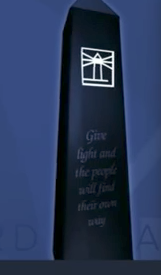
The team ventured into Syria, the deadliest country in the world for journalists, to follow several Western volunteers embedded with Kurdish militia as they uncovered the brutality of life under ISIS. Among its revelations: underground prisons ISIS used to jail Yazidis, a Kurdish religious community on the verge of extinction; sanctioning of the indiscriminate killing of Yazidis; and kidnapping of women and girls to sell as sex slaves. The film received a half-million views online, making it Fusion’s highest-viewed show in 2016. It alerted policy makers to the present dangers for those who travel to Syria to fight ISIS.
TV/Cable In-Depth Local Coverage, Jack R. Howard Award — $10,000
“Medical Waste” — WVUE-TV New Orleans, Lee Zurik, Jon Turnipseed, Tom Wright and Greg Phillips
As WVUE began looking into the rising costs of prescription drugs, a pharmacist’s insights revealed insurance companies’ secretive practices of charging patients more for prescription drugs – and then pocketing the difference. The practice, known as “clawbacks,” often caused consumers to pay more for prescription medications when using insurance than if they had purchased it outright. Contractually, insurance companies had forbidden pharmacists from telling customers they could save money by not using their insurance. The story led to 11 lawsuits and to legislation empowering pharmacists to tell customers they could save money by not using their co-pay. United Healthcare, one of the nation’s largest drug insurers and the main target of this investigation, announced it would stop the practice of overcharging customers.
Scripps Howard Foundation also recognizes excellence at the collegiate level for both journalism administration and teaching.
Administrator of the Year — $10,000
Maryanne Reed — Dean, Professor, Reed College of Media, West Virginia University
Teacher of the Year — $10,000
Allan Richards — Associate Professor, School of Journalism and Mass Communication, Florida International University
By the end of this fabulous evening celebrating real journalism and real journalists, it was a moment to forget the constant barrage of “alt facts” in this post-factual phase we find ourselves in. The assault on real media is real, and the work of mainstream journalists who continue to face it down is sometimes given an award as prestigious as the Scripps Howard Awards.
But mostly the work is done day-in and day-out in communities throughout America. And done with pride and purpose, with honestly and determination, with an eye on no prizes.
It matters.
Judy Clabes is editor and publisher of the nkytribune.com and KyForward.com, pursuits undertaken after a 37-year career with the E.W. Scripps Company as editor of the Sunday Courier & Press in Evansville, Ind. and The Kentucky Post, and as president and CEO of Scripps Howard Foundation.












